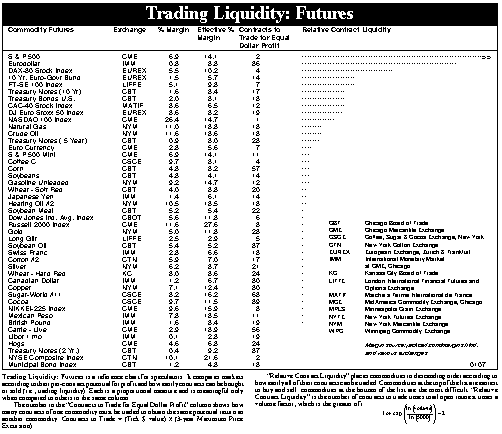COMMODITY FUTURES
The futures liquidity chart shown below is intended to rank publicly traded futures contracts in order of liquidity. Relative contract liquidity is indicated by the number of dots on the right-hand side of the chart.
This liquidity ranking is produced by multiplying contract point value times the maximum conceivable price motion (based on the past three years' historical data) times the contract's open interest times a factor (usually 1 to 4) for low or very high volumes. The greatest number of dots indicates the greatest activity; futures with one or no dots show little activity and are therefore less desirable for speculators.
All futures listed are weighted equally under "contracts to trade for equal dollar profit." This is done by multiplying contract value times the maximum possible change in price observed in the last three-year period. Thus, all numbers in this column have an equal dollar value.
Columns indicating percent margin and effective percent margin provide a helpful comparison for traders who wish to place their margin money efficiently. The effective percent margin is determined by dividing the margin value ($) by the three-year price range of contract dollar value, and then multiplying by one hundred.
STOCKS
Trading liquidity has a significant effect on the change in price
of a security. Theoretically, trading activity can serve as a proxy
for trading liquidity and equals the total volume for a given period expressed
as a percentage of the total number of shares outstanding. This value can
be thought of as the turnover rate of a firm's shares outstanding.
